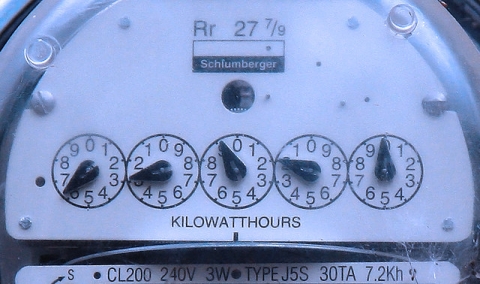
Dehydrated food you make yourself costs a lot less than what you can buy at the store. Still, people naturally wonder what it costs to run a dehydrator hour after hour. It’s easy to figure out the cost to run your dehydrator. You just need to know three things:
1. The wattage of the dehydrator
2. The hours needed to dehydrate
3. The cost of electricity
With the information above, you can calculate the cost of running your dehydrator in two steps. In step one, calculate how much electricity is used in Kilowatt-hours:
(Wattage × Hours needed) / 1000 = Kilowatt-hour (kWh) consumption
In step two, multiply the kWh by the cost per kWh in your area:
Cost = kWh * cost per kWh
So, for example, if you live in an area where electricity costs 12 cents per kWh, and you want to calculate the cost of running a 600 watt dehydrator for 12 hours:
(600 watts x 12 hours) / 1000 = 7.2 kWh
7.2kWh * $0.12 = $0.86
The chart below (click to expand) shows the cost to run machines of various wattages up to 24 hours. This chart assumes a cost per kWh of 12 cents, which is the current average in the US.
Note about Wattage
Most dehydrators have wattage clearly marked. If not, you can usually find the wattage on the bottom or back of the appliance. The stated wattage is the maximum power drawn by the appliance, so in most cases where you are not running the dehydrator at its maximum temperature, the actual energy used will be somewhat less than calculated. You can see the wattage for the dehydrators we've reviewed in our handy dehydrator comparison chart.
Dehydrator Cost Caculator worksheet
You can find out cost calculation worksheet here.


Comments
models with a thermostat
models with a thermostat "cycle" the element on and off. you didnt consider that
Yes. This is just a simple
How much does it cost to dehydrate food? | Dehydrator Review
I'm extremely impressed with your writing skills and also with the
layout on your weblog. Is this a paid theme or did you
customize it yourself? Anyway keep up the nice quality writing, it's
rare to see a nice blog like this one nowadays.
How much does it cost to dehydrate food? | Dehydrator Review
Hello, Neat post. There's an issue along with your web site in web explorer, would test this?
IE still is the market leader and a huge section off folks will misss your magnificent writing
due to this problem.
How much does it cost to dehydrate food? | Dehydrator Review
Hi to every body, it's my first pay a visit of this webpage; this web site
carries remarkable and truly fine data in support of visitors.
Variable
So its a consistent watt max chart
What about air conditioning?
This is great info about how much it costs to run the dehydrator, but I wonder about having a heat source working against your air conditioning. Here in Florida my a/c works full time to cool the house. I wonder how much harder my a/c is having to work to overcome the heat from the dehydrator??
I run my outside during the
How much does it cost to dehydrate food? | Dehydrator Review
Hi, I do believe this is an excellent web site. I stumbledupon it
;) I'm going to come back once again since i have saved as a favorite it.
Money and freedom is the best way to change, may
you be rich and continue to help other people.
Dehydrator in the summer
If you want to calculate for AC, you could roughly double the power consumption. The device has a fan and a heating element and most of the power output is in the form of heat, that heat then has to be cooled by your air conditioner which will consume just as many watts (likely more due to great inefficiencies) to cool that air back down and remove the humidity (which was put into the air by the dehumidifier).
Not exactly
That is not entirely correct, an air conditioner is in fact very efficient, but it does not cool the air, it merely moves the heat to another location and it will likely not spend more than half the energy the dehydrator adds to the system.
Additional cost of running A/C
Yes, not only are A/C systems very efficient in moving heat from one location to another there is an added benefit of removing moisture from the air where the dehydrating is being done. In the example of the individual doing there dehydrating in Florida I suspect that it is more efficiant to dehydrate indoors in low humidity rather than in the 90% humidity of Florida.
How much does it cost to dehydrate food? | Dehydrator Review
I read this piece of writing fully on the topic of
the resemblance of most recent and preceding technologies, it's
amazing article.
How much does it cost to dehydrate food? | Dehydrator Review
Thank you for the good writeup. It if truth be told used to be a enjoyment account it.
Glance complex to far introduced agreeable from you!
By the way, how could we keep in touch?
How much does it cost to dehydrate food? | Dehydrator Review
Wе're a buncһ off volսneers andd openiong a brand nnew scheme in our community.
Your web site offerеd us with helpful info to work on. You've performed a formidablе activit and ouuг
entire community miɡht be tһankful to yoս.
Ꭺlsoo visit mү homepage :: 918kiss (Laurinda)
How much does it cost to dehydrate food? | Dehydrator Review
Asking questions are in fact fastidious thing if you are not understanding anything entirely, but
this piece of writing presents good understanding yet.
How much does it cost to dehydrate food? | Dehydrator Review
Pienso que acabo de perder mi valioso tiempo tratando de interpretar este asunto.
Con sólo leer How much does it cost to dehydrate food?
es para reírse, mejor por una nota al principio.
You have a typo...
7.2*.12 = .86 not .66 Your chart is correct but you made a typo up in the description.
Yes, thanks. Should be fixed
Is it safe to Use Refurbished Electrical Equipments?
Can I use refurbished equipment from Yagi for the same experiment?
Wattage vs time required
Would a 1000 watt machine be faster than a 600 watt machine thereby equalizing the cost some?
Cost
Be sure to double the cost. Rates have gone up, you must include tax, distribution fees etc.
How much it cost to dehydrate food.
You mean to tell me that my dehydrator (which is an Elite Platinum dehydrator) Is a 250 watt.
So running it for 1 hr is only 0.03 cents?
Add new comment